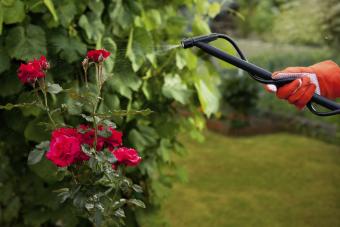
Adorable as they are, rabbits are pests in a garden. Rabbits are certainly cute, but they can wreak havoc on vegetables, flowers, trees, and shrubs. If you take pride in your garden or lawn, it's definitely important to know how to keep rabbits away from your gorgeous plants. While there isn't a foolproof natural way to repel rabbits from your precious plants, there are a number of methods that can help.
What to Plant to Deter Rabbits
While no plants will actually repel rabbits, there are some plants rabbits generally prefer to avoid. The plants listed below may help keep rabbits away when you include them in your garden, but this is not fail proof. If there are plants in your garden or yard that rabbits want to eat, chances are that they'll get in no matter what else is planted there. Some rabbits even like to eat plants that are believed to be unappealing to rabbits in general.
Herbs That May Deter Rabbits
Just like unpleasant smells can--to an extent--deter people from entering an area, the same is true with wildlife. Some herbs have a strong aroma that rabbits generally do not find to be appealing, so planting them in your garden can help them decide to choose other pastures for their grazing. Herbs with odors that rabbits usually don't care for include:
- Basil
- Mint
- Oregano
- Parsley
- Tarragon
Flowers That May Deter Rabbits
Some people say that planting marigolds around a garden's perimeter will deter rabbits, but this is not the case. Rabbits actually like to eat marigolds, along with many other flowers. They will actually be drawn to your garden if you edge it with marigolds. However, there are a few flowers that rabbits do actually prefer to avoid. They include:
- Bincas
- Cleomes
- Geraniums
- Wax begonias
Vegetables That May Deter Rabbits

There are even some vegetables that can be off-putting to rabbits, at least to some degree. Planting the vegetables listed below may discourage rabbits from seeking out the plants in your garden that they want to munch on. For the best results, plan these vegetables near lettuce, green beans, and other plants that rabbits like to eat.
- Asparagus
- Garlic
- Leeks
- Onions
- Potatoes
- Rhubarb
- Squash
- Tomatoes
DIY Barriers to Repel Rabbits
Companion planting is a great thing, and there are a lot of great reasons to plant flowers and herbs that people claim will deter rabbits. Just don't expect plants to actually repel rabbits. If that is your goal, you'll want to use a barrier method in addition to--or instead of--strategically sowing plants that may help keep bunnies away.
Exclusion Fencing
If you want to repel rabbits from your garden, consider surrounding it with a rabbit-proof fence that will keep them from being able to gain access. You don't have to put up an expensive chain link or privacy fence. A simple fence fashioned from chicken wire, hardware cloth, or wire mesh will do the trick. You could even use flexible polypropylene netting, but it won't last as long as wire. Make sure the openings are not larger than one inch by two inches. The fence doesn't need to be tall; two feet is the perfect height. However, be sure to keep in mind that rabbits can burrow underneath things. To truly deter rabbits, the fence should ideally be buried several inches under the ground. If that isn't feasible, at least stake the fence securely to the ground.
Tree Trunk Guards
If you have an issue with rabbits damaging the first few feet of your trees or shrubs, you don't have to go so far as to erect fences around these objects. Instead, you can simply encircle the first few feet of the trunk of the tree or shrub with hardware cloth. This will keep bunnies from being able to sink their teeth into bark that is within their reach. For a tree with a single trunk, the University of Missouri Extension recommends using a quarter-inch hardware cloth. For shrubs that have multiple stems, you could opt to use one-inch wire mesh instead. In either case, the mesh should go into the ground to prevent burrowing. If these options are not feasible, you could use plastic tubes or chicken wire, though these materials may not last as long as wire mesh.
Tree Tubes
Wire mesh and chicken wire aren't the only options for protecting tree trunks. Plastic tubes are another good resource for protecting trees and well as tall, leggy plants from rabbits. This option works particularly well with fruit trees and other trees that have relatively small trunks. You can purchase commercial tree tubes made for this purpose. Depending on the size of your tree, you may be able to use PVC pipe or you may need to purchase a larger type of plastic tube. or a sheet of easily bendable plastic that you can cut to the size you need and wrap around your tree.
More Natural Ways to Deter Rabbits
If you don't want to rely on plantings alone but aren't ready to install fencing or trunk guards, consider using one or more scent-based options. You can also use these options in addition to the strategies suggested above.
Essential Oils
The powerful concentration of scents that essential oils deliver makes them a great deterrent to rabbits. Mint and peppermint essential oils are good choices, as are lemon balm and rosemary. You can buy essential oils or make your own. Just can place three to five drops of essential oil onto a cotton ball and place it on the ground by the plants you wish to protect from rabbits. Be careful not to get the oil onto your hands since it is very concentrated and could irritate your skin.
Coffee Grounds
Used coffee grounds are a great garden resource. Many gardeners add spent coffee grounds to their compost pile or even use them to enhance the soil in which they plant tomatoes. Like many herbs, coffee grounds have a strong scent that rabbits don't like. So, sprinkling coffee grounds around plants that rabbits tend to target can discourage rabbits from snacking on them.
Red Pepper Powder

If you want a powerful deterrent, red pepper powder or red pepper flakes are touted as great rabbit repellent options. Just sprinkle the powder or flakes around and on top of the plants that you wish to protect. You can get extra mileage out of your pepper when you add it to other types of repellents, such as talc powder or coffee grounds. Caution: If your dogs or cats sniff around your garden, avoid this approach in order to spare your pets a painful experience (and a possible vet visit).
DIY Rabbit Repellent Spray
Rather than using essential oils or plain red pepper, you can create your own offensive smelling spray to spritz in the parts of your yard and garden that you want rabbits to avoid. The easy-to-prepare recipe below includes garlic, onions, peppermint, and red chili peppers.
Supplies
Gather the following supplies.
- Food processor or blender (to chop/puree ingredients)
- Mesh sieve/strainer
- Garden sprayer
- Large bowl with lid
- Measuring cup
- Spoon
- Spatula
Ingredients
Gather the following ingredients. (It's fine to vary the items or quantity a bit; just stick with items with scents that rabbits find unappealing.)
- 4 large onions
- 4 cups of fresh peppermint (stems and leaves)
- 2 garlic bulbs
- 5 red chili peppers
Directions
Follow these steps:
- Slice onions and garlic into halves or quarters. (There is no need to peel them.)
- Place these and the remaining ingredients into a blender or food process.
- Process until liquid or puree consistency.
- Add 1 cup of water and blend
- Pour all ingredients into a bowl.
- Use a spatula or spoon if necessary, to remove all of the mixtures.
- Cover with lid and set aside for 24 hours.
- At the end of 24 hours strain your mixture using the mesh strainer.
- Pour the strained liquid into your spray.
- Add water to your mixture until it reached the sprayer fill line.
- Spray your garden with the mixture.
When the rabbit returns, you'll know it's time to respray the garden or to try a different remedy.
Cracking the Code: How to Keep Rabbits out of Gardens
It can be tough to deter rabbits from your yard or garden, especially if you have plants they find appealing and you don't want to have to resort to trapping them or applying commercial liquid or granular repellent, which is expensive and isn't always effective. For best results, you may want to try several of the options listed above simultaneously. Or, you may want to experiment by implementing individual strategies in different parts of your yard to see which ones seem to work best.







